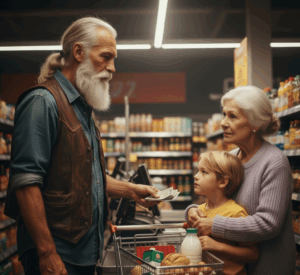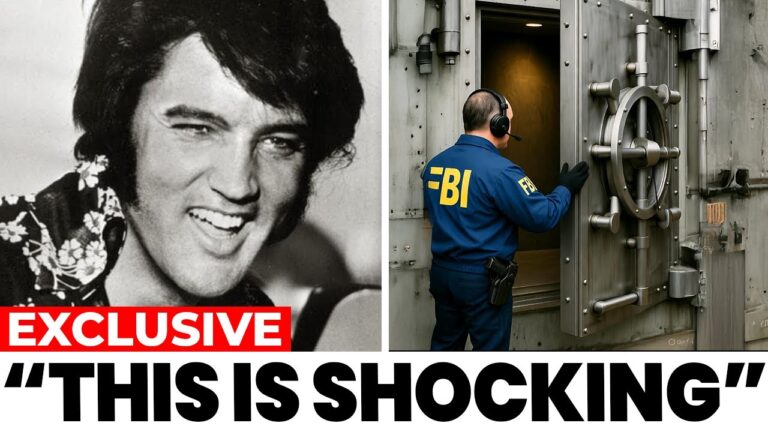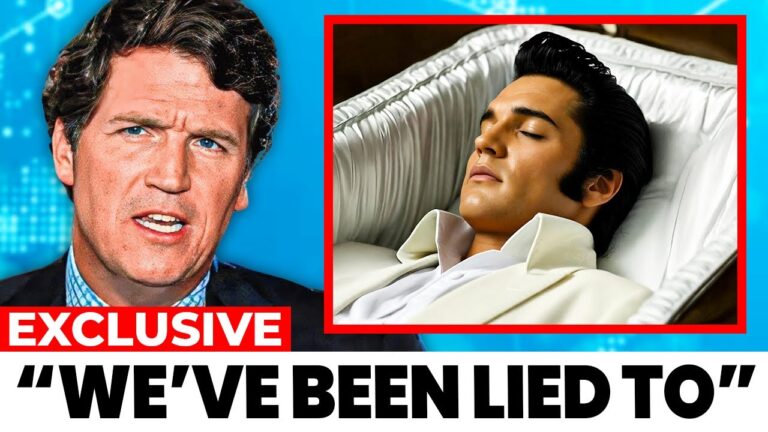Every Thursday afternoon, just as the church bells of Millstone rang three, the low rumble of a 1985 Harley-Davidson Electra Glide echoed down Main Street.
People at Harper’s Grocery smiled as the sound grew nearer. Children at the bus stop pointed. The cashiers glanced at the clock. Everyone knew what it meant.
It wasn’t just a biker.
It was The Thursday Rider.
At first, no one knew his real name.
He was a tall man in his seventies, with silver hair tied low and a thick, neatly kept beard.
His leather jacket was worn to the seams, the patches so faded they were unreadable.
To most, he was a mystery. But every Thursday, he walked into Harper’s Grocery, gave a polite nod to the clerks, and wandered the aisles.
What set him apart wasn’t how he looked — it was what he did.
The First Time
It began on a rainy Thursday in March.
Maria Lopez, a single mother of two, stood at the checkout counter. Her cart held only the basics — milk, bread, cereal, eggs. Nothing fancy.
When the cashier announced the total — $94.12 — Maria’s hands trembled. She began pulling items out.
Maria (softly):
—“Take the cereal off. We’ll be fine without it. And… the cheese too.”
Her son tugged at her sleeve.
—“Mom, but the cheese—”
She shook her head, blinking hard.
That’s when a weathered hand placed the cheese back on the belt.
Thursday Rider:
—“Put it all back. I’ve got it covered.”
Maria gasped.
—“Sir, I can’t let you—”
He smiled gently.
—“You’re not letting me do anything. I’m just paying for groceries. Happens every day.”
He handed the cashier a hundred-dollar bill.
—“Keep the change. For her next trip.”
By the time Maria turned to thank him, he was gone — his Harley fading into the rain.
The Veteran
Weeks later, James Carter, a 67-year-old veteran, saw it happen again.
A young couple stood at the register. Their card was declined.
The mother bounced a crying baby on her hip. Their cart was full of diapers and formula.
The father, embarrassed, stammered:
—“I just started a job… get paid Friday. Can we leave the formula until then?”
Before the cashier could respond, the biker stepped forward.
Thursday Rider:
—“Feed your baby. That’s what matters.”
He swiped his card before the young man could argue.
Father (shaking):
—“Sir, we’ll pay you back, I promise—”
Thursday Rider:
—“No debts between us. Just remember this day. One day, you’ll do the same for someone else.”
James, watching, felt a lump in his throat.
He knew that look — the quiet burden only veterans carried.
The Teenager
Another Thursday, a teenager in a faded hoodie stood at checkout with bread, ham, and milk.
He counted his change, but came up two dollars short.
Teenager:
—“Please, just the bread and the milk then.”
The cashier sighed, reaching for the ham, when the biker spoke from behind:
—“Kid, your mom’s lucky to have you. Keep the ham.”
He tapped his card and nodded. The boy whispered a shaky “thank you” and bolted out, clutching the bag like treasure.
The Widow
Not all he helped were families. Some were just lonely souls.
Mrs. Helen Brooks, an elderly widow, came every Thursday.
She bought only what she needed — half a loaf of bread, one apple, a pint of milk.
Her pension barely covered it.
One week, while she compared prices, the biker quietly added a roast chicken, a pie, and fresh fruit to her cart.
At checkout, she looked stunned.
—“Sir, I can’t accept this—”
Thursday Rider:
—“You can. Everyone deserves a full table once in a while.”
She cried right there, hugging him despite his stiff leather jacket.
A Pattern
Week after week, month after month, The Thursday Rider came.
No fanfare. No photos. No name.
For himself, he bought only the cheapest things — ramen noodles, canned soup, off-brand coffee.
Rebecca Torres, the store manager, began keeping quiet track.
In six months, he’d spent nearly $15,000 helping strangers.
Rebecca (softly):
—“He’s giving everything away…”
The Disappearance
Then came November.
One Thursday, he didn’t come.
Nor the next.
By the third week, people started asking.
Maria:
—“Where’s the motorcycle man? I wanted to thank him again.”
James:
—“I wanted to finally learn his name.”
Rebecca called the number linked to his card. Disconnected.
She checked his license plate through a DMV contact.
Daniel “Dan” Reilly. Age 72.
Then came the blow:
A retired firefighter. Stage IV pancreatic cancer. Now in hospice care.
Rebecca whispered:
—“That’s why he stopped coming…”
The Community Rises
Rebecca told the others.
Maria wept. James clenched his jaw. Mrs. Brooks covered her mouth.
Maria:
—“We can’t let him fade away alone. He’s been our guardian angel. Now it’s our turn.”
That night, they acted.
Maria launched a GoFundMe. James called the VFW.
Church groups, bikers, and strangers all joined in.
By Monday, they’d raised $25,000.
The Visit
That Thursday, instead of Harper’s Grocery, dozens gathered at the hospice.
A convoy of motorcycles, cars, even a school bus filled with signs rolled in.
Inside, Dan Reilly lay frail but smiling.
Dan (hoarse):
—“You all… here? Thought I’d bought my last round.”
Maria took his hand.
—“Not yet, Dan. Thursdays aren’t over. This time, we’re covering you.”
Laughter, stories, food, and music filled the room.
For the first time in weeks, Dan’s eyes gleamed with life again.
The Miracle
The fundraiser paid for experimental treatments.
Astonishingly, his cancer went into partial remission.
Enough to let him ride again.
That December Thursday, Main Street thundered with engines — dozens of bikes gleaming in the sun.
At the front, Dan rode in a sidecar, waving like a king.
Inside Harper’s Grocery, everyone cheered.
That day, every purchase was free — in his honor.
On the wall above the fruit section, a plaque now reads:
“In honor of Daniel Reilly — The Thursday Rider — who showed us that kindness never dies.”





